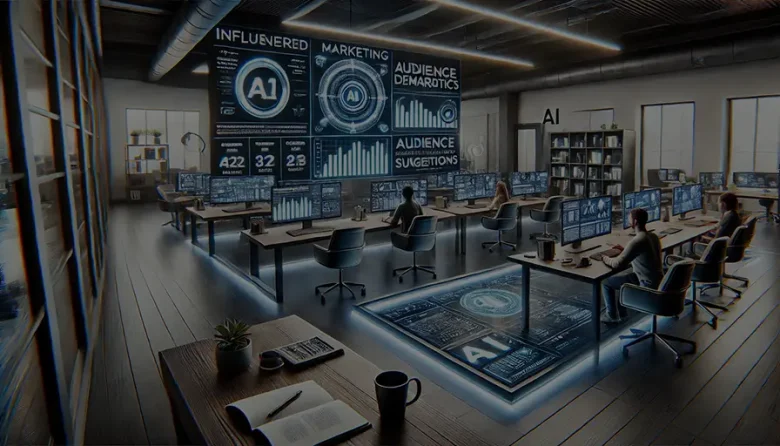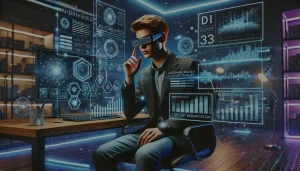Table of Contents
Every day, the digital universe is changing at an astonishing rate, driving profound changes in various sectors. Among these innovations, artificial intelligence (AI) has stood out as a revolutionary agent, especially in the way brands and influencers connect with their audiences. This scenario not only redefines strategies and work methods, but also expands the possibilities for personalization, efficiency and measurement of results in campaigns and partnerships. By exploring the multiple dimensions of this revolution, the reader will discover how AI is reshaping the way we think and act in the digital environment, promoting an era where data, automation and creativity come together to create remarkable experiences.
Fundamental Concepts
What is Artificial Intelligence?
Artificial intelligence is a branch of computer science that focuses on developing systems capable of performing tasks that would traditionally require human intelligence. These tasks include pattern recognition, decision-making, and natural language processing. Advances in machine learning and deep learning enable machines to learn and adapt over time, continually improving their capabilities and offering increasingly accurate solutions.
Historically, AI began with theoretical concepts and basic experiments, evolving into practical applications ranging from virtual assistants to sophisticated recommendation systems. This evolution has enabled companies and professionals across a range of industries to adopt intelligent technologies to streamline processes, improve operational efficiency, and deliver personalized experiences to consumers.
Evolution of AI in Influencer Marketing
Initially, the use of digital technologies in influencer marketing was limited to simple statistical analysis and social media management. With the advancement of artificial intelligence, the way of interacting with the public has undergone a radical transformation. The ability to analyze large volumes of data in real time has enabled influencers to identify trends, adjust strategies and maximize engagement much more effectively.
The implementation of recommendation algorithms, for example, allows content to be distributed in a personalized way, increasing the relevance of campaigns. In parallel, automation tools and data analysis have emerged to accurately measure the performance of each action, allowing for dynamic adjustments and a better understanding of consumer behavior. This evolution has not only optimized processes, but also enabled the creation of smarter campaigns, based on insights validated by concrete data.
The Revolution in Influencer Marketing
Digital Transformation and the New Scenario
Digital transformation has been the catalyst for significant changes in the influencer landscape. Today, the convergence of data, algorithms, and automation technologies is creating a new paradigm where every interaction and click can be analyzed to generate valuable insights. This detailed measurement capability allows strategies to be adjusted in real time, resulting in more efficient and targeted campaigns.
In this new scenario, the role of influencers goes beyond simply promoting products or services. They become real digital strategists, capable of shaping narratives and creating experiences that directly engage with the public’s expectations and needs. Artificial intelligence enhances this transformation, providing tools to identify the ideal consumer profile, predict behavioral trends and accurately measure the results of actions.
Advantages of AI for Influencers
The adoption of AI brings numerous advantages to influencers, who now have access to a technological arsenal capable of transforming the way they interact with their audience. Among the main benefits, the possibility of personalizing content according to the individual preferences of followers stands out. With the use of sophisticated algorithms, it is possible to segment the audience very precisely, increasing the relevance of each message and promoting deeper engagement.
Additionally, automating repetitive processes allows influencers to focus on strategic activities, such as authentic content creation and building relationships. Measuring results, carried out through tools data analysis, makes it possible to quickly identify which campaigns are performing best and which ones need adjustments. This ability to respond immediately is crucial to maintaining competitiveness in a dynamic and constantly evolving market.
Practical Examples and Case Studies
Several brands and influencers are already reaping the benefits of implementing AI-based technologies. A notable example is the use of recommendation systems on digital platforms, which suggest personalized content for each user. This strategy not only increases the time followers spend on social media, but also improves the quality of interaction, since the content displayed is aligned with previous interests and behaviors.
Studies of Case studies show that influencers who adopt these technologies achieve significantly higher engagement rates, often doubling the number of clicks and interactions compared to traditional methods. Companies that have invested in data analysis and automation have seen a significant increase in the effectiveness of their campaigns, with returns that fully justify the investments made. These results show that AI is not just a passing trend, but an essential tool for those seeking to stand out in the competitive digital world.
AI Technologies and Tools Applied to Influencer Marketing
Recommendation Algorithms and Data Analysis
Recommendation algorithms are the backbone of many digital platforms. They use machine learning techniques to analyze user behavior, identify patterns, and suggest content that may spark greater interest. In the context of influencer marketing, this technology allows each message to be targeted in a personalized way, increasing the likelihood that the audience will identify with the content.
Data analysis tools, in turn, provide a detailed view of the performance of each action. By monitoring variables such as engagement rate, viewing time and browsing behavior, it is possible to dynamically adjust strategies, continually improving the content distributed. These technologies work together to create an ecosystem where personalization and efficiency go hand in hand, generating measurable and sustainable results.
Chatbots and Automated Service
Another fundamental application of AI in the influencer universe is the use of chatbots and automated customer service systems. These solutions allow interaction with the public to happen continuously and without interruptions, providing immediate responses to questions and requests. In campaigns where fast and efficient communication is essential, chatbots act as true assistants, ensuring that no interaction goes unanswered.
In addition to improving customer service, these tools allow for the collection of relevant data about followers’ preferences and needs. This information is vital for adjusting future strategies and creating campaigns that truly resonate with the public. By automating processes, influencers can dedicate more time to creating quality content and developing strategic partnerships, increasing the level of professionalism and efficiency in their activities.
Monitoring Tools and Metrics
In the digital environment, measuring results is essential for the success of any strategy. Monitoring tools allow you to track, in real time, the performance of campaigns and the interaction of followers with the content. Detailed analysis of metrics such as reach, impressions, clicks and shares provides a comprehensive view of the effectiveness of the actions implemented.
These tools are also capable of integrating data from different sources, such as social networks and content platforms, offering a complete overview of audience behavior. With these insights, it is possible to quickly identify which strategies are working and which ones need to be revised. Accurate measurement and the ability to make dynamic adjustments are differentiators that make artificial intelligence an indispensable ally for professionals working in influencer marketing.
Content Strategies and Targeted Approaches
Keyword Research and Trend Identification
For any communication strategy to be successful, it is crucial to have in-depth knowledge of the target audience’s behavior and preferences. Keyword research, for example, is a technique that allows you to identify which terms and topics are trending, guiding the creation of content that directly addresses the expectations of followers. This approach ensures that messages are relevant and connect naturally with the audience.
By combining trend analysis with artificial intelligence, influencers can not only identify the most popular topics, but also predict what will be the next hot topics. This predictive ability is extremely valuable, as it allows campaigns to be planned in advance, taking advantage of the ideal timing for disseminating content and maximizing engagement.
Content Structuring and Use of Engaging Narratives
Organizing your content is a key element in capturing and maintaining your audience’s attention. Proper structuring, with clear titles and subtitles, makes it easier to read and allows followers to quickly find the information they’re interested in. In addition, using engaging narratives, which contain real stories and success stories, makes the content more attractive and memorable.
Artificial intelligence can also help create personalized narratives based on each follower’s profile. By analyzing behavioral data, it is possible to adapt the language and tone of the content, making it closer to individual preferences and increasing the emotional connection with the public. This combination of structure and personalization results in an enriching and transformative experience for readers.
Interconnection and Engagement Techniques
Another essential strategy is to create connections between different content and platforms. By integrating complementary information and promoting the exchange of experiences, influencers can expand the reach of their messages and generate productive discussions. This collaborative approach not only strengthens the relationship network with the public, but also encourages active participation, transforming readers into true participants in the process.
The interconnection of content, through references to studies, cases and personal experiences, creates an environment where learning and knowledge exchange are constant. This dynamic contributes to the construction of an engaged community, which feels motivated to explore new ideas and share its own experiences. The result is a network of interactions that enhances the impact of campaigns and strengthens the digital presence of influencers.
Ethical Considerations and Technical Challenges
Technical Challenges and Limitations
Despite the many benefits provided by artificial intelligence, it is important to recognize that the technology still faces significant challenges. Issues related to the accuracy of algorithms and the integration of data from different sources are common, requiring constant improvement and adaptation of solutions. These limitations can affect the accuracy of analyses and, consequently, the effectiveness of the strategies adopted.
Another point of concern is the complexity involved in implementing intelligent systems. Integrating different platforms and ensuring that the data collected is processed securely and efficiently requires considerable investment in infrastructure and training. Although technology is constantly evolving, it is essential that professionals are aware of these limitations and work collaboratively to overcome technical obstacles.
Ethical and Privacy Issues
The use of artificial intelligence raises a number of ethical issues, especially with regard to privacy and transparency in the use of data. In a scenario where the collection and analysis of personal information becomes increasingly sophisticated, it is imperative that influencers and brands adopt responsible and ethical practices. Transparency in the collection and use of data is essential to build and maintain public trust, avoiding exposure to risks and abuse.
Regulation and compliance with data protection laws are aspects that cannot be overlooked. Measures that ensure users’ informed consent and the protection of personal data must be rigorously implemented. This ethical stance not only strengthens the image of professionals, but also contributes to building a safer and more reliable digital environment.
Impact on the Influencer-Audience Relationship
The adoption of advanced technologies can, in some cases, create a barrier between influencers and their followers. Automation and excessive personalization, if not applied carefully, can lead to the dehumanization of communication, making the audience feel treated as a mere statistic. To avoid this risk, it is essential that technology is used as a complement to genuine interaction, and not as a substitute for human relationships.
Maintaining authenticity and proximity is crucial to ensure that trust and engagement are not compromised. Artificial intelligence should serve as a tool that enhances communication capabilities without distorting the essence of the emotional connection that characterizes relationships between influencers and their audiences. Balancing technology and humanity is the great challenge for those who want to make the most of the benefits of AI without losing their identity and authenticity.
The Path to the Future
Emerging Trends and Innovations
The future points to an even deeper integration between artificial intelligence and business strategies. digital influence. With the continuous advancement of technologies, we can expect the emergence of increasingly sophisticated solutions capable of anticipating behaviors and offering ultra-personalized experiences. Tools that combine predictive analysis, natural language processing and pattern recognition promise to revolutionize the way content is planned and distributed.
The convergence of AI with other innovations, such as augmented reality and the Internet of Things (IoT), will also open up new possibilities for interactive and immersive campaigns. This evolution will allow influencers to create unique experiences where audiences not only consume content, but also interact in an active and engaging way. Trends point to a scenario in which technology will become a natural extension of human creativity, expanding the horizons of digital communication.
Adaptation and Training for Professionals
To keep up with this evolution, it is essential that professionals in the sector invest in training and constant updating. Familiarity with tools and techniques based on artificial intelligence not only improves the quality of campaigns, but also strengthens the position of influencers in the market. Specialized courses, workshops and events have proliferated, offering learning opportunities that help integrate technology effectively and ethically.
Adapting to new tools should be seen as an ongoing process that requires curiosity, flexibility, and a willingness to experiment. Professionals who constantly update themselves are better prepared to identify opportunities, overcome challenges, and innovate their strategies. This search for knowledge and improvement is one of the pillars that sustain evolution and success in the contemporary digital scenario.
Possible Scenarios and Long-Term Impacts
In the long term, artificial intelligence has the potential to completely reshape the influencer marketing landscape. Scenarios where technology enables near-instant and personalized interaction with each follower are increasingly plausible, radically transforming the way relationships are built in the digital environment. This transformation could lead to greater democratization of access to information, where small and large voices have the opportunity to stand out in a balanced way.
Furthermore, the economic and social impacts resulting from this revolution are profound. By automating processes and improving the accuracy of analyses, it is possible to optimize resources and increase the efficiency of campaigns, benefiting not only influencers but the entire digital ecosystem. This new reality requires constant reflection on the role of technology in society, encouraging debates that seek to reconcile innovation, ethics and social responsibility.
Summary and Final Reflections
Throughout this article, we have covered several aspects that illustrate how artificial intelligence is redefining influencer marketing. Understanding the fundamentals and historical evolution of AI provides a solid foundation for recognizing its impact on the current digital landscape. The transformation promoted by new technologies not only expands the possibilities for personalization and measurement of results, but also establishes a new standard of interaction between brands, influencers and their audiences.
The use of recommendation algorithms, chatbots and monitoring tools demonstrates that artificial intelligence can take digital campaigns to the next level, providing valuable insights and enabling dynamic adjustments that boost engagement. However, it is essential that this technology is used ethically and responsibly, preserving the authenticity and human relationships that are the essence of success in the influencer universe.
The vision of the future presented reveals a scenario where the integration of creativity and technology will be key to developing innovative and effective strategies. Professionals who invest in training and adapt quickly to new tools will be better positioned to face the challenges and seize the opportunities that arise. In this context, artificial intelligence not only boosts campaign performance, but also contributes to building a smarter, more agile and connected digital environment.
The discussion proposed here invites the reader to reflect on the role of technology in the transformation of digital interactions and to recognize that, despite the technical and ethical challenges, the benefits of artificial intelligence are undeniable. The ability to personalize content, analyze data accurately and automate processes represents a true revolution, which has the potential to reshape the future of influencer marketing in profound and lasting ways.
Professionals and brands that adopt this new approach can benefit from more assertive communication, capable of creating emotional and meaningful connections with their audiences. The constant evolution of AI technologies ensures that innovations will continue to emerge, challenging the status quo and paving the way for increasingly creative and efficient strategies. The digital age is constantly changing, and artificial intelligence is undoubtedly one of the main drivers of this change.
The search for intelligent solutions and the desire to innovate transform the digital environment into a space of unlimited opportunities. By combining data analysis, content personalization and process automation, influencers have powerful tools at their disposal to build narratives that captivate and inspire. This synergy between technology and creativity not only drives results, but also redefines the parameters of what it means to connect with an audience in an increasingly digital and dynamic world.
In short, the revolution brought about by artificial intelligence in influencer marketing is a multifaceted phenomenon, encompassing everything from technical and operational aspects to ethical and social challenges. The ability to transform data into insights, personalize experiences and accurately measure results highlights the value of this technology for the digital environment. When reflecting on the advances and emerging trends, it is clear that the future holds innovations that, combined with human creativity, will be decisive in building a more interactive, efficient and engaging scenario.
This journey towards an increasingly intelligent and personalized digital environment requires not only the adoption of new tools, but also a change in mindset. Professionals and influencers who are open to these transformations will be at the forefront of a new era, where artificial intelligence will be an indispensable ally in creating unique and impactful experiences. The dialogue between technology and humanity is the key to a promising future, where each interaction becomes an opportunity for learning and mutual growth.
Reflecting on these issues invites a change of perspective: seeing technology not as an end in itself, but as a means to broaden horizons and transform the way we connect and share stories. The digital revolution is, above all, a celebration of the human capacity to innovate and reinvent ourselves, creating solutions that speak to the needs and aspirations of each individual. By embracing this new reality, brands and influencers have the opportunity to build a lasting legacy, based on excellence, ethics and the constant search for innovation.

Lucas Almeida is a digital marketing and innovation specialist, focusing on technology trends and strategies for influencers. With a degree in Business Administration and an MBA in Marketing, Lucas combines market insights with a practical approach, offering accessible analysis and content for entrepreneurs, content creators and professionals seeking constant evolution in the digital landscape.




